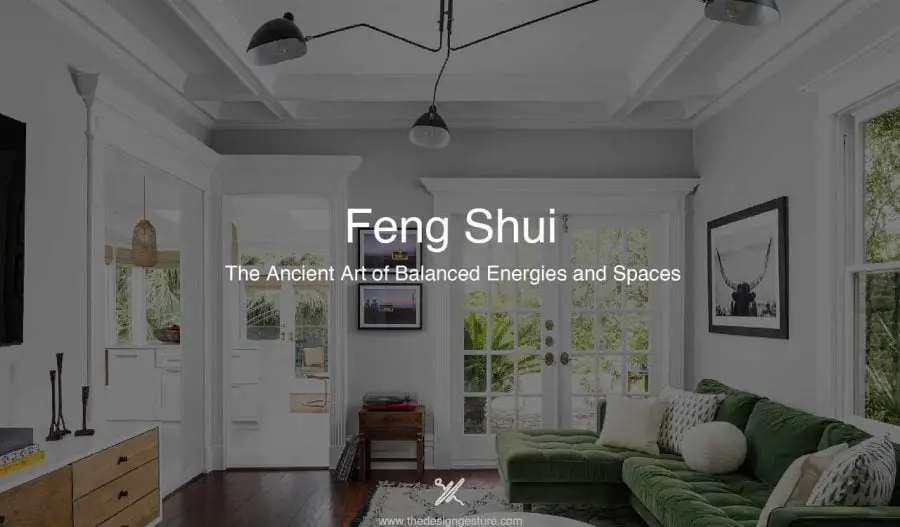“The mother art is architecture. Without an architecture of our own we have no soul of our own civilization.” – Frank Lloyd Wright
Frank Lloyd Wright’s statement, “The mother art is architecture. Without an architecture of our own we have no soul of our own civilization,” speaks to the profound influence of architecture on shaping the essence and identity of a civilization. This sentiment can be further connected to the principles of Feng Shui, a Chinese philosophical system that emphasizes the harmonious arrangement of physical spaces to enhance the flow of energy or “chi.”
Just as Frank Lloyd Wright’s words highlight the importance of architecture in shaping a civilization’s soul, Feng Shui emphasizes that the arrangement and design of spaces directly impact the well-being, energy levels, and overall harmony of its inhabitants.
Feng Shui suggests that the architecture of space should be in alignment with the natural world and the flow of energy. Buildings and spaces are ideally situated to allow positive energy to flow smoothly and unobstructed.
Just as a civilization’s architecture reflects its identity and soul, the practice of Feng Shui demonstrates how architecture can influence the energy and well-being of the people within a space. Both concepts underscore the idea that architecture goes beyond mere functionality; it shapes the essence of civilisation and the experiences of its inhabitants.
Table of Contents
Introduction
An ancient Chinese practice known as feng shui involves placing structures, items, and spaces in a way that promotes harmony and balance in the surrounding environment. The term “the way of wind and water” refers to feng shui. Its origins can be traced back to the early Taoist movement, but it is still widely practiced today and has reached Western cultures as well as all of China.
Chi, or the life force that permeates everything, is a concept that the Taoists believed to be the source of feng shui. Yang and yin components combine to form chi. It is impossible to separate these competing yet complementary forces. Taoists held that yin and yang balance can help people maintain a positive flow of chi in their life while reducing the flow of bad chi.
By strategically placing furniture, accents, buildings, and even entire cities, feng shui seeks to balance yin and yang and enhance the flow of chi. The ancient Chinese believed that setting up objects to produce positive chi would assure good health, enhance social interactions, and bring success and riches.
Even though the feng shui movement’s beginnings are obscure, there is proof that the Chinese have been planning their cities and dwellings according to its principles for more than 4,000 years. Ancient Chinese cemetery sites are some early examples of feng shui because they were placed in places where attracting good chi was crucial.
Modern homeowners apply feng shui principles to decorate their homes all over the world. Since chi can enter and exit through doors and windows, many feng shui principles concern what objects to place there or far from them. The five elements of water, wood, fire, earth, and metal are the simplest ways to alter the feng shui of a space. These five sorts of materials can be used to categorise all materials. Practitioners claim that adding, removing, or combining these things will significantly increase the flow of good chi.
Principles of Feng Shui
The Bagua is an ancient floor map that explores the energy dynamics of a space, and it is included in the basic Feng Shui principles. The Bagua, which is divided into eight sections, offers guidance on a variety of topics, including riches and abundance, fame and reputation, love, family and fresh beginnings, completion and children, knowledge, career and life path, as well as helpful people and travel. You are depicted in the middlebox.
Positive Chi energy can be directed to key areas of your existence using the Bagua map as a guide. You can use the appropriate Feng Shui techniques in the appropriate sections of your home to improve particular regions.
Superimposing the Bagua Map onto your floor design is one useful way to incorporate it into your house. You can align the entry with the southern direction, coincident with one of the lower three squares, by sketching up your floor plan and laying the nine-quadrant map on top of it. The Bagua map can be efficiently used to improve the energy flow within any chosen place, whether you’re applying Feng Shui principles to a large house or a single room.
5 Elements of Feng Shui
The world is divided into five components according to feng shui: wood, fire, earth, metal, and water. Try balancing the elements in a room if it doesn’t feel quite right to make it cosier. Each component creates a distinct ambiance, resulting in a location advantageous for your personality and objectives.
Wood
The power of the Wood element in Feng Shui can be best understood as the ability to harness the essence of creation and progress. The characteristics of expansion, strength, intuition, and flexibility are represented by this element. Too much Wood energy can make you feel overpowered and obstinate, while too little might make you feel depressed and stuck.
Consider the stout sturdiness of tree trunks and the delicate delicacy of foliage and blooming when using the Wood element in design. Wood’s colors are represented by a relaxing green and a peaceful blue, much as how leaves sway in the wind.
Fire
The Fire element, which inspires a dynamic fervour, infuses places with increased energy and promotes leadership skills. This component cultivates the skill of verbal expression, sparks confidence, and exudes fearlessness. But too much Fire might encourage propensities for excessive acrimony, restlessness, and impetuous acts. In contrast, a lack of Fire can result in emotional numbness, a lack of a forward-thinking perspective, muted expressiveness, and a lower sense of self-worth. The secret to utilising the Fire element’s tremendous qualities while avoiding its possible downsides is to balance it within the design.
Earth
Physical power and order are influenced by the earth, which also creates a sense of stability, balance, and anchoring. People frequently have a weighty sense and become more bored, lethargic, and serious when there is an excessive amount of earth in a given location. People may feel disorganised, confused, and unfocused when there is insufficient earth.
Metal
Metal impairs rationality and mental clarity. It is possible to sense the presence of metal in a space by observing how organised, focused, righteous, and analytical one is. One can come across as chatty, too critical, and prone to speaking without thinking when someone is surrounded by a lot of metal. It’s possible to get a sense of stillness, caution, and lack of focus when there isn’t enough metal.
Water
Spirituality and emotions are directly related to the realm of Water. Design that successfully incorporates the Water element develops creativity, insight, and wisdom. However, a lot of water around can make you feel emotionally immersed and cause uneven changes in your feelings. This could make you feel overstimulated and overly sociable. Conversely, a lack of empathy, a sense of isolation, increased tension, and a propensity for triviality could result from insufficient water in the design. It is essential to achieve equilibrium with the Water element in order to foster its enlightening qualities and avoid imbalances.
The Concept of Ying Yang
In the context of Feng Shui, the concept of yin and yang revolves around achieving a delicate equilibrium between opposing energies: the masculine yang and the feminine yin-chi energies. These contrasting forces collaborate harmoniously to establish balance and tranquility.
Yang embodies vibrant, active, and assertive energy, whereas yin represents passive, subdued, and shadowy energy. The convergence of these two energies forms a unified and harmonious whole, known as chi energy. The allocation of yin and yang energy holds significance; yin is suited for serene and restful spaces like bedrooms, while yang energy complements more socially vibrant and productive areas such as kitchens and home offices.
Reinstating the yin-yang equilibrium within your living space can be achieved by introducing specific elements, colors, or symbols. Incorporating lively and energetic hues into your decor can infuse more yang energy, whereas softer, soothing shades can cultivate a greater sense of yin energy.
To ensure equilibrium across every room in your home, a preliminary step involves discerning the purpose each room serves in your life. For instance, a bedroom is a haven for rest and rejuvenation, necessitating a touch more yin. Achieving this could involve employing gentle hues and gentle lighting to foster a cozy ambiance. Conversely, spaces designed for social interaction, like the kitchen or dining room where guests are entertained, would benefit from a higher infusion of yang energy to invigorate the environment.
Feng Shui and Mental Health
Feng shui might benefit improved mental health.
A lack of sleep can make a person irritable and increase their chances of developing mood disorders including sadness and anxiety. An investigation into the effects of feng shui bedroom changes on rest and well-being involved 134 individuals. People who applied feng shui concepts to their sleeping arrangements reported noticeably better sleep.
Other research employing scientific data, including actigraphy monitoring sleep-wake cycles, agreed with feng shui concepts regarding the best bedroom layouts for restful sleep. These guidelines include thoughtful bed layout, avoiding mirror placement, sleeping with your head turned south, and limiting your exposure to electronic screens.
Conclusion
When it comes to bringing peace and harmony to our surroundings, feng shui serves as a compassionate travel companion. Think of it as an elegant dance of energies that demonstrates to us how to balance various emotions and forces. We learn about the potential influence of elements like wood, fire, earth, metal, and water on our places. Although experts may disagree, many people are drawn to the idea of designing spaces that feel appropriate. Feng Shui subtly suggests that by making intentional modifications to our surroundings, we might improve our general state of well-being.




